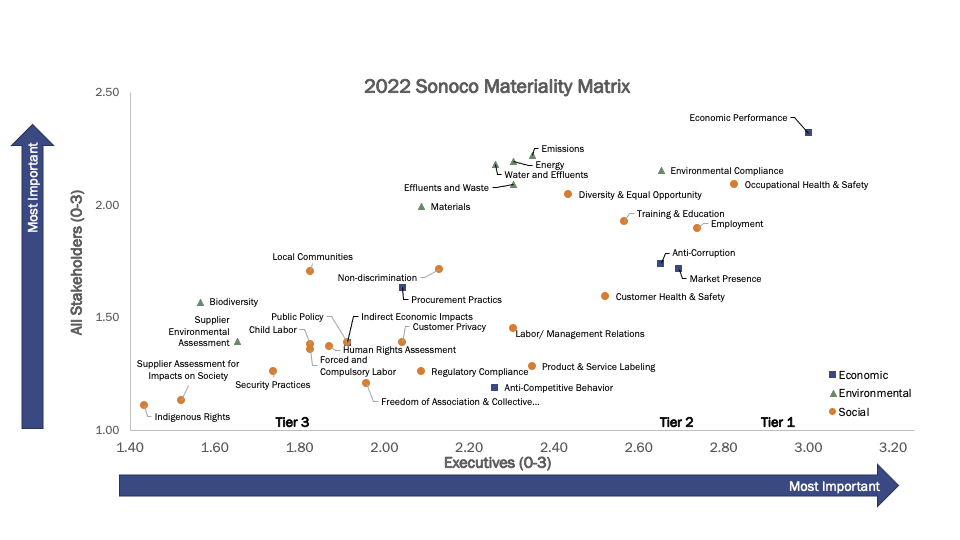Oversight
We're pursuing sustainability at every level of Sonoco. Meet our Sustainability Council, our Public Responsibility Committee, and our internal education, engage and innovate teams.
Leadership Teams
Corporate Sustainability Council
Our Corporate Sustainability Council provides oversight, guidance, and direction on social, community, and environmental issues that impact the reputation and economic viability of the company and our stakeholders. The council meets quarterly and reports to and is sponsored by Sonoco’s president and CEO. The council reports on Sonoco’s sustainability activities, biannually, to the Board of Directors.
Objectives
- Identify and define those issues that are relevant to Sonoco's long-term sustainability and image as a good corporate citizen
- Establish meaningful long- and short-term sustainability objectives related to key areas of focus and provide Sonoco's executive committee with recommendations and guidance on how to meet those objectives
- Recommend and establish new Company guidelines, policies and processes to support areas of focus
- Create and communicate a business case for corporate sustainability
- Provide recommendations for the Company's philanthropic efforts in support of overall corporate sustainability objectives
Meet the Sustainability Council
- Howard Coker, President and Cheif Executive Officer (Sponsor)
- Elizabeth Rhue, Vice President, Global Environmental, Sustainability, and Technical Services (Chair)
- Lisa Weeks, Vice President, Investor Relations, Corporate Affairs, and Strategy
- Rodger Fuller, Chief Operating Officer
- Russell Grissett, President, Global Flexibles
- James Harrell, President, Global Industrial Paper Packaging
- Sean Cairns, President, Global Rigid Paper and Closures
- Susan Albritton, U.S. Field Manager, Sonoco Recycling
- Scott Byrne, Director, Global Sustainability Services
- Steve Charles, Director, Strategic Sourcing
- Jeffrey Tomaszewski, President, Diversified Businesses
- Palace Stepps, Vice President and General Manager, Paper Products and Fiber Supply
- Marci Tuten, Vice President, Deputy General Counsel, and Cheif IP Counsel
- Anne Marie Lopiccolo, Chief Human Resource Officer
- Rebecca McCord, Associate Director, Strategic Sourcing
- Ernest Haynes, President, Metal Packaging
- Edward Harrington, Director, Environmental Services
- Elizabeth Kremer, Assistant Corporate Secretary
- John Florence, Vice President, Human Resources, General Counsel and Secretary
Board of Directors Employee and Public Responsibility Committee
The Employee and Public Responsibility Committee of the Board of Directors provides oversight and guidance on social and public policy issues, including compliance with governmental or other regulatory requirements, which may impact business performance and the investment potential of Sonoco.
Materiality Process
In 2022, Sonoco completed a new materiality assessment of economic, environmental, and social issues.
Our quantitative, stakeholder-driven approach identified and prioritized the sustainability issues material to our company and our stakeholders. The issues analyzed were aligned with the Global Reporting Initiative (GRI) G4 Reporting Principles and Standard Disclosures.
Stakeholder Identification
We established stakeholder groups:
- Customers
- Suppliers
- Industry peers
- Shareholders
- Non-governmental organizations
- Community leaders
- Regulators/government
- Sonoco employees
Peers, customers, suppliers, investors and shareholders, non-governmental organizations and regulators were assessed based on publicly available data including websites, annual reports, 10-K filings, corporate social responsibility reports, materiality matrices, news releases and mission statements. Sonoco leadership, employees and community leaders assessed the impact of each of the GRI aspects based on the impact to Sonoco using an online survey.
Stakeholder Prioritization
To help drive our focus to the most important issues, we weighted each stakeholder group based on the group’s influence and dependence on Sonoco.
- Highly influential stakeholder groups are most able to impact Sonoco’s achievement of strategic objectives.
- Highly dependent stakeholder groups are more positively or negatively impacted by Sonoco’s operations.
Each stakeholder group was assigned a relative influence and dependency score based on a three-point scale, giving their aggregated aspect ratings greater or less importance.
Analysis
Each issue identified was rated on a four-point scale based on the perceived significance of the issue to the stakeholder. Issues not mentioned by stakeholders in available sources were deemed less important to the stakeholder. Issues which were either mentioned in multiple public sources or published by the stakeholder as organizational goals or performance indicators, or listed as an issue of high importance in a materiality matrix, were scored higher. In the online survey, issues were also measured on a four-point scale of importance. After rating the significance of each issue by stakeholder, we classified the issues into a common terminology using the aspects included in the economic, environmental and social categories of the GRI G4 Reporting Principles and Standard Disclosures. We then aggregated the ratings across the external stakeholder groups to calculate the average rating of each issue by group.
